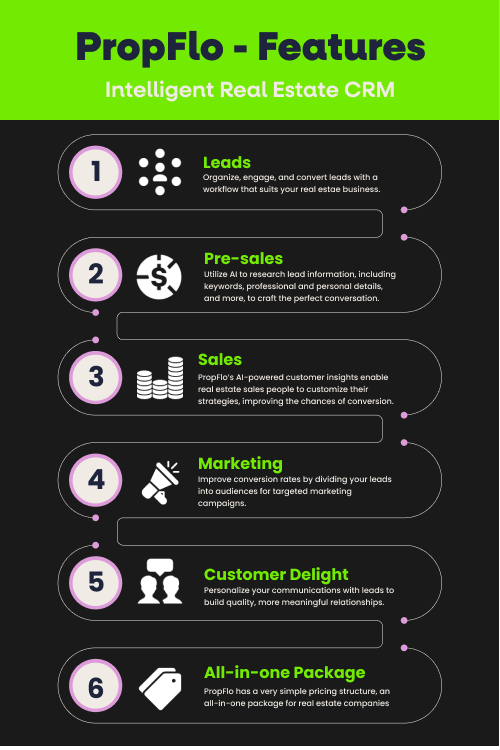Guide To Real Estate Mastery With CRM
CRM technology stands at the center in the world of real estate, where every lead, interaction and relationship has the potential to evolve into a successful deal.
In the dynamic world of real estate, where every lead, every interaction, and every relationship holds the potential to translate into a successful deal, the role of Customer Relationship Management (CRM) technology has never been more crucial.
For real estate professionals on the front lines, the daily grind isn't just about properties and paperwork; it's about understanding and connecting with clients on a deeply personal level.
In this blog, tailored specifically to the needs of real estate sales professionals, we'll delve into the heart of CRM technology and explore how it functions in the real estate sector.
Imagine you're a real estate agent racing against the clock to respond to a lead's inquiry, juggling multiple property listings, and striving to build long-lasting relationships with your clients.
This is where CRM technology steps in as your trusty sidekick. It's the digital assistant that helps you keep track of every detail, every conversation, and every opportunity, all while ensuring no lead goes unnoticed.
CRM Technology in Real Estate
At its core, CRM technology in this context serves as a real estate agent's secret weapon, seamlessly integrating into their daily routines and supercharging their efficiency:

Efficient Lead Management
Picture this scenario: a potential buyer stumbles upon a property listing online and fills out a contact form. Without CRM technology, that lead might get lost in the shuffle of emails and phone calls.
However, with a robust CRM system, that lead is instantly captured, recorded, and added to your list of prospects.
Property Management
The lifeblood of any real estate business lies in its property listings.
CRM technology provides you with a centralized database where you can meticulously organize and manage every property you're representing.
Imagine effortlessly searching for and presenting the perfect listing to a client based on their specific requirements, thanks to the intuitive property management features.
Communication Tracking
Successful real estate professionals know that timely and personalized communication is key to building trust with clients. CRM tools not only keep track of emails, phone calls, and text messages but also categorize and archive these interactions.
This means you can easily reference past conversations, recall important details, and never miss a follow-up opportunity.
Automation
Real estate agents are multitasking masters, but some tasks are repetitive and time-consuming. CRM technology automates these processes, freeing up your valuable time. Imagine sending out automated follow-up emails after a property showing or automatically scheduling appointment reminders.
These little time-savers add up to a significant boost in productivity.
In essence, CRM technology acts as your personal real estate assistant, ensuring that no lead falls through the cracks, no property detail is overlooked, and no communication is forgotten.
However, it's crucial to remember that while standard CRM systems offer these benefits, the real estate sector's unique demands call for a more specialized approach.
Let's explore why a real estate-specific CRM solution is the need of the hour.
The Need for a Real Estate-specific CRM
As a real estate professional, you're not just selling properties; you're navigating the intricacies of an industry with a unique set of challenges and opportunities.
While standard CRM systems are incredibly valuable, they often fall short when it comes to addressing the specific needs of real estate salespeople. Here's why the real estate sector urgently requires a CRM solution that is intelligent and can handle the entire lifecycle of a real estate client.
Property-Centric Approach
Real estate revolves around properties - their details, locations, features, and histories. A generic CRM may lack the depth required to manage the extensive data associated with multiple properties. An intelligent CRM on the other hand, understands the importance of property-centric organization.
It empowers you to categorize, filter, and search properties with precision, ensuring you can quickly match listings to your clients' preferences.
Long Sales Cycles
Real estate transactions often have long gestation periods. It may take months or even years for a lead to evolve into a successful deal. A standard CRM might struggle to handle such extended sales cycles.
Also read: How To Boost Your Real Estate Sales with an Intelligent CRM
A tailored CRM, designed with real estate in mind, provides tools for nurturing leads over time. It supports automated follow-ups, tracks client interactions, and helps you stay top-of-mind until the right opportunity arises.
Complex Transaction Management
Real estate deals involve intricate documentation, legalities, and negotiations. Generic CRMs may not offer the specialized features necessary for managing these complexities effectively.
A real estate-specific CRM streamlines transaction management, allowing you to track each step of the process, from offer acceptance to closing, ensuring nothing slips through the cracks.
Client Relationship Nurturing
Building trust and maintaining relationships is the lifeblood of real estate success. Real estate clients often require a high degree of personal attention and tailored communication.
A CRM designed for this industry understands the importance of nurturing client relationships over time.
It offers features for personalized follow-ups, client categorization, and insights into client preferences, helping you deliver exceptional service and create lasting bonds.
Local Market Expertise
Real estate is inherently local, with market dynamics varying significantly from one region to another. A generic CRM might not capture the nuances of local real estate markets.
A specialized CRM, however, can incorporate local market data, trends, and insights, helping you stay ahead in your specific geographic area.
Integration with Real Estate Tools
Real estate professionals rely on various specialized tools and platforms, such as MLS listings, property valuation tools, and e-signature solutions.
A real estate-specific CRM can seamlessly integrate with these tools, streamlining your workflow and reducing manual data entry.
Compliance and Data Security
Real estate transactions involve sensitive personal and financial information. A CRM tailored for the industry understands the importance of compliance with data protection regulations and offers enhanced security measures to safeguard client data and maintain regulatory compliance.

While CRM technology is undeniably indispensable for real estate salespeople, a real estate-specific CRM takes your capabilities to the next level.
It aligns perfectly with the intricacies of the industry, allowing you to manage properties, nurture leads, and build relationships with unparalleled efficiency.
By investing in a CRM solution tailored to the unique demands of the real estate sector, you position yourself for success in an industry where every detail matters and every relationship counts.
The Power of CRM Strategy
In the world of real estate, where relationships are everything, CRM technology alone, no matter how sophisticated, is not enough to ensure success.
To truly thrive in this competitive landscape, real estate professionals need to complement their CRM technology with a well-crafted CRM strategy.
Here's why CRM strategy is the key to unlocking the full potential of CRM technology in the real estate sector
Segmentation and Targeting
A well-thought-out CRM strategy starts with segmentation. Divide your client database into meaningful categories based on criteria such as location, property type, budget, and buying stage.
By understanding your clients' unique needs, you can create highly targeted marketing campaigns and communication strategies.
For example, you can send personalized property recommendations to clients who have shown interest in specific neighbourhoods or property types, increasing the chances of conversion.
Personalization
Real estate clients value personal attention. A CRM strategy should emphasize the power of personalization. Leverage the data stored in your CRM to send tailored content, emails, and recommendations.
Imagine a scenario where your CRM system automatically sends birthday greetings to clients or provides them with information on new listings that align with their previous property searches.
These personalized touches go a long way in building rapport and trust.
Also Read: From Complaint to Loyalty: Navigating the Customer Experience Landscape
Lead Nurturing
Real estate deals are not always immediate; they often require time and nurturing.
A CRM strategy should include a well-defined lead nurturing process. Automate follow-up emails, newsletters, and periodic check-ins to keep potential clients engaged over the long term. This consistent communication ensures that your brand remains top-of-mind when they are ready to make a move.
Analytics and Reporting
The real estate landscape is ever-changing. Your CRM strategy should be data-driven. Utilize the analytics and reporting capabilities of your CRM system to gain insights into your sales pipeline, conversion rates, and the effectiveness of your marketing efforts.
By tracking key performance indicators (KPIs), you can adjust your strategy in real-time, optimizing your resources and maximizing ROI.
Feedback Loops
Encourage client feedback and actively listen to their input. A well-implemented CRM strategy includes feedback loops that gather insights on client satisfaction, preferences, and pain points.
This information can guide product development, marketing tactics, and client service improvements, enhancing the overall customer experience.
Training and Adoption
A CRM system is only as effective as the team using it. A robust CRM strategy includes ongoing training and adoption initiatives. Ensure that your real estate professionals are well-versed in utilizing the CRM system's features to their full potential.
Regular training sessions and updates keep your team sharp and maximize the system's efficiency.
Integration with Other Tools
Real estate professionals rely on a plethora of tools and platforms, from virtual tour software to e-signature solutions. Your CRM strategy should incorporate seamless integration with these tools, streamlining workflows and reducing manual data entry.
This ensures that your team spends less time on administrative tasks and more time on building relationships and closing deals.
Customer Lifecycle Management
A CRM strategy should map out the entire customer lifecycle, from initial contact to post-sale support. It should outline touchpoints, communication strategies, and actions to take at each stage.

By doing so, you can maintain ongoing relationships with past clients, potentially turning them into repeat customers and referral sources.In essence, CRM technology is the foundation, but CRM strategy is the architect's blueprint.
When these two elements work in harmony, real estate professionals can position themselves as customer-centric, achieving maximum ROI and differentiating themselves in a competitive market.
A well-executed CRM strategy ensures that technology serves a greater purpose: building and nurturing the relationships that are the lifeblood of the real estate industry.
Related Articles
FAQs
1) What are the objectives of CRM strategy?
Typically, the objectives of CRM revolve around enhancing the customer experience, ultimately leading to increased sales. This is the essence of CRM (Customer Relationship Management) software, emphasizing that nurturing relationships is the path to achieving CRM goals.
2) What makes a CRM strategy successful?
Achieving a successful CRM strategy entails mapping out alterations to your workflow, outlining actions for each implementation phase, specifying your objectives and measurement criteria, and aligning CRM with your business development strategy.
3) What are the problems with CRM strategy?
CRM initiatives often encounter difficulties stemming from four primary factors: unclear objectives or strategy, insufficient support and commitment, challenges in implementing the technology, and inadequate employee training. Additionally, selecting an ill-suited CRM for the organization's requirements can also lead to issues.
4) What is the biggest risk to CRM success?
The biggest risk to the achievement of CRM objectives is a lack of user engagement. Regardless of the capabilities and features a CRM system offers, its effectiveness in aiding business goals hinges on how proficiently your employees utilize it.


